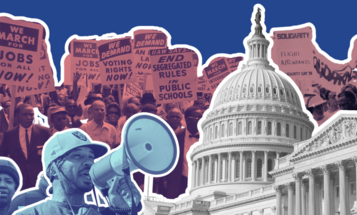
Right Still Leans on Social Darwinism
Narratives like Paul Ryan’s “maker vs. taker” narrative is resurrected Social Darwinism, where the poor are lazy and the rich are virtuous.
Conservative and libertarian arguments about social spending are rooted in the discredited Social Darwinism of Herbert Spencer and William Graham Sumner.
Social Darwinism was the intellectual vogue of early 19th century sociology. The movement, led by Herbert Spencer, who coined the term, “survival of the fittest.” purported to apply Darwinian principles to the working of society. The attempt was doomed from the start because Spencer also relied on the discredited theories of Jean-Baptiste Lamarck, who believed that traits acquired during an organism's lifetime could be passed down to offspring. Spencer also assumed that society was subject to “natural laws,” rather than being an artificial construction as prominent sociologist Lester Ward argued.
Spencer’s work suited conservatives, because he argued against social reform to help the poor because their poverty was to due to weakness. They were unfit and should be eliminated. He argued against all state intervention, which would impede the natural development and progression of society.
William Graham Sumner became a leading proponent of Social Darwinism, arguing that the wealthy were rich because of natural selection and argued that their wealth was a social service. Sumner argued that hereditary wealth allowed the fittest to pass on their virtues to children. He argued, “Let it be understood that we cannot go outside this alternative: liberty, inequality, survival of the fittest; not-liberty, equality, survival of the unfittest. The former carries society forward and favors all its best members; the latter carries society downwards and favors all its worst members.” That is, people are not shaped by society, but rather have intrinsic qualities and the market should filter out the weak from the strong.
In Sinclair Lewis’s, Babbitt, George Babbitt describes the tenants of social Darwinism,
The first thing you got to understand is that all this uplift and flipflop and settlement-work and recreation is nothing in God's world but the entering wedge for socialism. The sooner a man learns he isn't going to be coddled, and he needn't expect a lot of free grub and, uh, all these free classes and flipflop and doodads for his kids unless he earns 'em, why, the sooner he'll get on the job and produce—produce—produce! That's what the country needs, and not all this fancy stuff that just enfeebles the will-power of the working man and gives his kids a lot of notions above their class.
Social Darwinism assumes that markets are efficient and the only just way to allocate resources in a society and that any deviation from the market outcome would stunt society’s development by “coddling” the poor. This sanctification of the market became untenable for most Americans in the wake of the Great Depression.
The backlash against Social Darwinism eventually ushered in a progressive era. F. Scott Fitzgerald and Thorstein Veblen exposed the fallacy that the wealthiest had superior scrupules or a strong work ethic. Henry George noted that, “Mr. Spencer is like one who might insist that each should swim for himself in crossing a river, ignoring the fact that some had been artificially provided with corks and other artificially loaded with lead.” Peter Kropotkin, noted that the biological world was rife with interspecies co-operation and that this cooperation in the face of environmental struggle drove progress. The progressive era brought about programs to increase opportunity, shared sacrifice and the social safety net.
In the 1980s, Social Darwinism re-emerged in the form of supply-side economics - the theory that the rich drive society and the poor hang along for the ride. As J.K. Galbraith noted of Reagan’s economic program,
Let us take supply-side theory at its face value, however modest that may be. It holds that the work habits of the American people are tied irrevocably to their income, though in a curiously perverse way. The poor do not work because they have too much income; the rich do not work because they do not have enough income. You expand and revitalize the economy by giving the poor less, the rich more.
The most prominent proponent of the new Social Darwinism was Charles Murray, whose Losing Ground provided key support for anti-welfare crusaders by arguing that the social safety net has made the poor lazy and that society is splitting in two, between the hard-working and justly rich and the lazy poor. In his essay, "The Coming White Underclass," Murray exemplifies the hands-off conservatism and “survival of the fittest” mentality of social darwinism:
To restore the rewards and penalties of marriage does not require social engineering. Rather, it requires that the state stop interfering with the natural forces that have done the job quite effectively for millennia… Restoring economic penalties translates into the first and central policy prescription: to end all economic support for single mothers. The AFDC (Aid to Families With Dependent Children) payment goes to zero. Single mothers are not eligible for subsidized housing or for food stamps. An assortment of other subsidies and in-kind benefits disappear… From society's perspective, to have a baby that you cannot care for yourself is profoundly irresponsible, and the government will no longer subsidize it.
More recently, Social Darwinism has been embraced by the Conservative wunderkid, Paul Ryan who worries that,
We don't want to turn the safety net into a hammock that lulls able-bodied people into complacency and dependence.
Paul Ryan’s “maker vs. taker” narrative is also resurrected Social Darwinism, where the poor are lazy and the rich are virtuous and all government intervention makes the poor lazier and robs the rich of their deserved rewards.
Although Richard Hofstadter declared social Darwinism dead in the early 20th century, he warned that “A resurgence of social Darwinism… is always a possibility as long as there is a strong element of predacity in society.” With inequality tearing at the social bonds necessary to maintain the welfare state, old Spencerian arguments are being used to justify cuts to the minimum wage, food stamps and Medicaid spending. As the famous Johnson ad goes, “poverty is not a trait of character, it is created anew in each generation, but not by heredity, by circumstances.”


